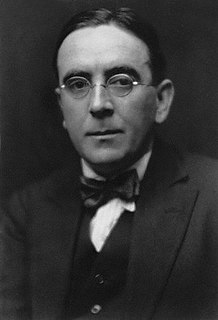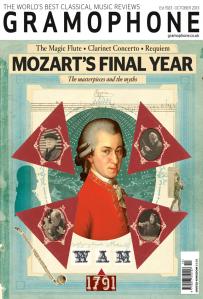
George Gershwin was an American composer and pianist whose compositions spanned both popular and classical genres. Among his best-known works are the orchestral compositions Rhapsody in Blue (1924) and An American in Paris (1928), the songs Swanee (1919) and Fascinating Rhythm (1924), the jazz standard I Got Rhythm (1930), and the opera Porgy and Bess (1935) which spawned the hit Summertime.

Rhapsody in Blue is a 1924 musical composition by the American composer George Gershwin for solo piano and jazz band, which combines elements of classical music with jazz-influenced effects.
The Rhapsody on a Theme of Paganini, Op. 43, is a concertante work written by Sergei Rachmaninoff. It is written for solo piano and symphony orchestra, closely resembling a piano concerto, albeit in a single movement. The work was written at his summer home, the Villa Senar in Switzerland, according to the score, from July 3 to August 18, 1934. Rachmaninoff himself, a noted interpreter of his own works, played the solo piano part at the piece's premiere at the Lyric Opera House in Baltimore, Maryland, on November 7, 1934 with the Philadelphia Orchestra, conducted by Leopold Stokowski. Rachmaninoff, Stokowski, and the Philadelphia Orchestra made the first recording, on December 24, 1934, at RCA Victor's Trinity Church Studio in Camden, New Jersey.
A rhapsody in music is a one-movement work that is episodic yet integrated, free-flowing in structure, featuring a range of highly contrasted moods, colour, and tonality. An air of spontaneous inspiration and a sense of improvisation make it freer in form than a set of variations.

Masashi Hamauzu is a Japanese composer, arranger, pianist, and lyricist. Hamauzu, who was employed at Square Enix from 1996 to 2010, was best known during that time for his work on the Final Fantasy and SaGa video game series. Born into a musical family in Germany, Hamauzu was raised in Japan. He became interested in music while in kindergarten, and took piano lessons from his parents.
Rhapsody or variant may refer to:
The Second Rhapsody is a concert piece for orchestra with piano by American composer George Gershwin, written in 1931. It is sometimes referred to by its original title, Rhapsody in Rivets.
Edward Joseph Collins was an American pianist, conductor and composer of classical music in a neoromantic style.
The Fantasia on Hungarian Folk Melodies, commonly known in short form simply as the Hungarian Fantasy, is Franz Liszt's arrangement for piano and orchestra of his Hungarian Rhapsody No. 14, originally for solo piano. The Fantasia was written in 1852 and premiered in Pest on June 1, 1853, with Hans von Bülow as soloist and Ferenc Erkel conducting the orchestra.
The Première rhapsodie by Claude Debussy is a piece for accompanied solo clarinet. Composed between December 1909 and January 1910, it was dedicated to the French clarinet professor Prosper Mimart.
Two Pieces for Piano is a work for piano solo composed in 1921 by John Ireland (1879–1962).
Rhoda Sinclair Coghill was an Irish pianist, composer and poet.
John Buckley is an Irish composer and pedagogue, a co-founder of the Ennis Summer School and member of Aosdána.
Preludes for Piano is a set of four short pieces for piano solo composed by John Ireland between 1913 and 1915. They were published in the latter year.
First Rhapsody is a piece for piano solo by the English composer John Ireland.
Two Pieces for Piano is a set of two pieces for piano solo composed in 1925 by John Ireland.
Two Pieces for Piano is a work for piano solo composed in 1929–30 by John Ireland.
Ballad is a piece for piano solo composed in 1929 by John Ireland.
Mai-Dun is an orchestral work composed in 1921 by John Ireland (1879–1962). He called it a symphonic rhapsody; another description might be tone poem. In 1931, he arranged it for piano four hands.






